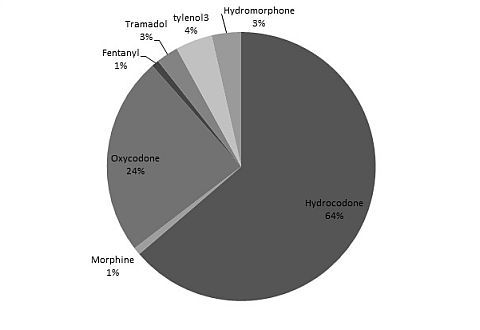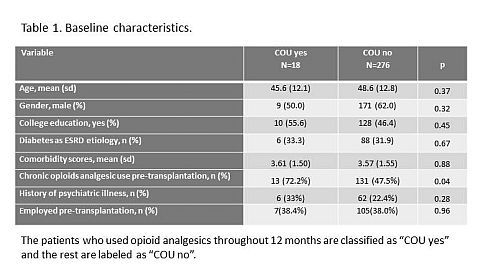Chronic Opioid Usage Early after Kidney Transplantation
Internal Medicine, University of Michigan, Ann Arbor, MI
Nephrology, Renal Medicine Associates, Albuquerque, NM
Meeting: 2013 American Transplant Congress
Abstract number: A810
Introduction: Chronic opioids usage (COU) is common among patients with end stage renal disease (ESRD) receiving dialysis treatment and associated with poor clinical outcomes. We investigated the magnitude of COU during the first year after kidney transplantation.
Materials and Methods: Between January 2004 and June 2005, all ESRD patients undergoing kidney transplantation at our institution were included. A history of COU prior to and during the first 12 months after transplantation was ascertained through detailed chart review. Other pertinent demographic and baseline characteristics were obtained as well. Descriptive and univariate statistical analysis were performed.
Results: Among 294 patients who had completed at least 1 year follow-up after transplantation, 68 (23.1%) patients were prescribed opioid analgesics at any given time during the first year, of which 53 (18.0%), 33 (11.2%) and 27 (9.2%) patients had required them at 1, 3 and 12 months post-transplantation, respectively. Eighteen patients (6.1%) used opioid analgesics throughout the 12 months. The most commonly prescribed opioid analgesics was hydrocodone (64%) followed by oxycodone (24%) and others.

None of 18 COU patients had opioids prescribed by the transplant center at the end of 12 months. Patients with chronic opioid usage after transplantation had higher prevalence of pre-transplant chronic pain and analgesic use (table 1).

Conclusion: COU is not uncommon after renal transplantation. Larger sample size is needed for reliable analysis regarding the prevalence and patterns of prescription opioid use and their effect on the clinical outcomes.
To cite this abstract in AMA style:
Kulshrestha S, Barrantes F, Kommareddi M, Samaniego-Picota M, Luan F. Chronic Opioid Usage Early after Kidney Transplantation [abstract]. Am J Transplant. 2013; 13 (suppl 5). https://atcmeetingabstracts.com/abstract/chronic-opioid-usage-early-after-kidney-transplantation/. Accessed February 16, 2026.« Back to 2013 American Transplant Congress
